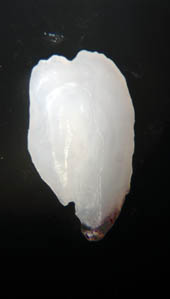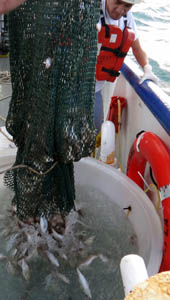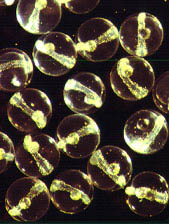The fish ecology group at the Fisheries and Mariculture Laboratory (FAML) investigates a range of fundamental ecological questions. Our aim is to understand individual and population level processes that influence resilience of fishes in the face of changing environmental conditions. We conduct experiments in the laboratory to identify mechanisms driving ecological dynamics and investigate wild populations to assess variability in both individual traits and population fluctuations.
EARLY LIFE HISTORY
Mortality rates during the larval period are extremely high in marine fishes, normally more than 90%. Small variations in mortality rates during early life can have profound effects on year-class strength and population size. This is the foundation of our work in larval fish ecology, which seeks to understand the mechanisms of larval mortality and the effects of internal and external changes. We measure performance fish larvae in terms of ecologically meaningful traits or “survival skills,” such as the timing and magnitude of escape responses and foraging rate, and compare performance through ontogeny and in response to a variety of environmental and physiological conditions to understand how the capacity of larvae to survive is affected.
Trophic complexity
The function and positioning of fishes in marine food webs is an essential component of marine ecosystems dynamics. We aim to understand the importance of diet composition, quality, and nutrient cycling on the survivability and resilience of fishes, particularly those species that undergo ontogenetic niche shifts during their lifetime.
To complement our eco-physiological studes on the role of certain fatty acids in larval escape responses (see Nutrition and Larval Success under Physiology), we are assessing temporal and geographic variability in the fatty acid profiles of field-collected red drum eggs and relating it to climatological drivers and population-level consequences.
Investigators
- Lee A. Fuiman
- Parvathi Nair













